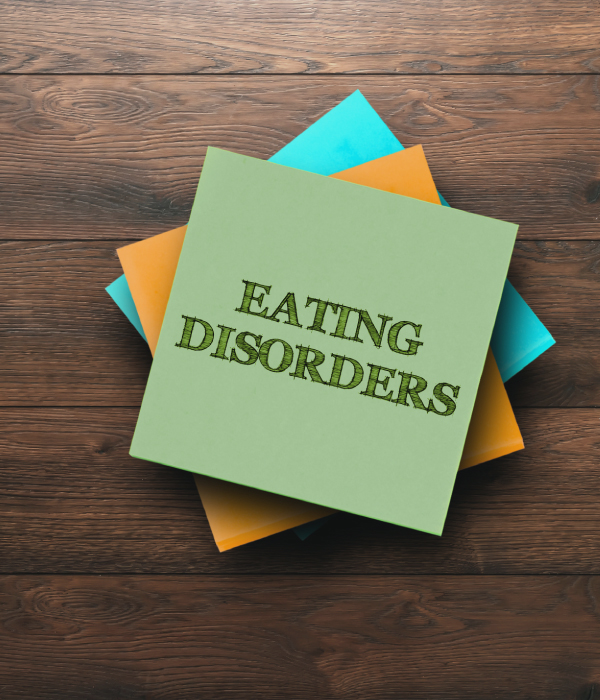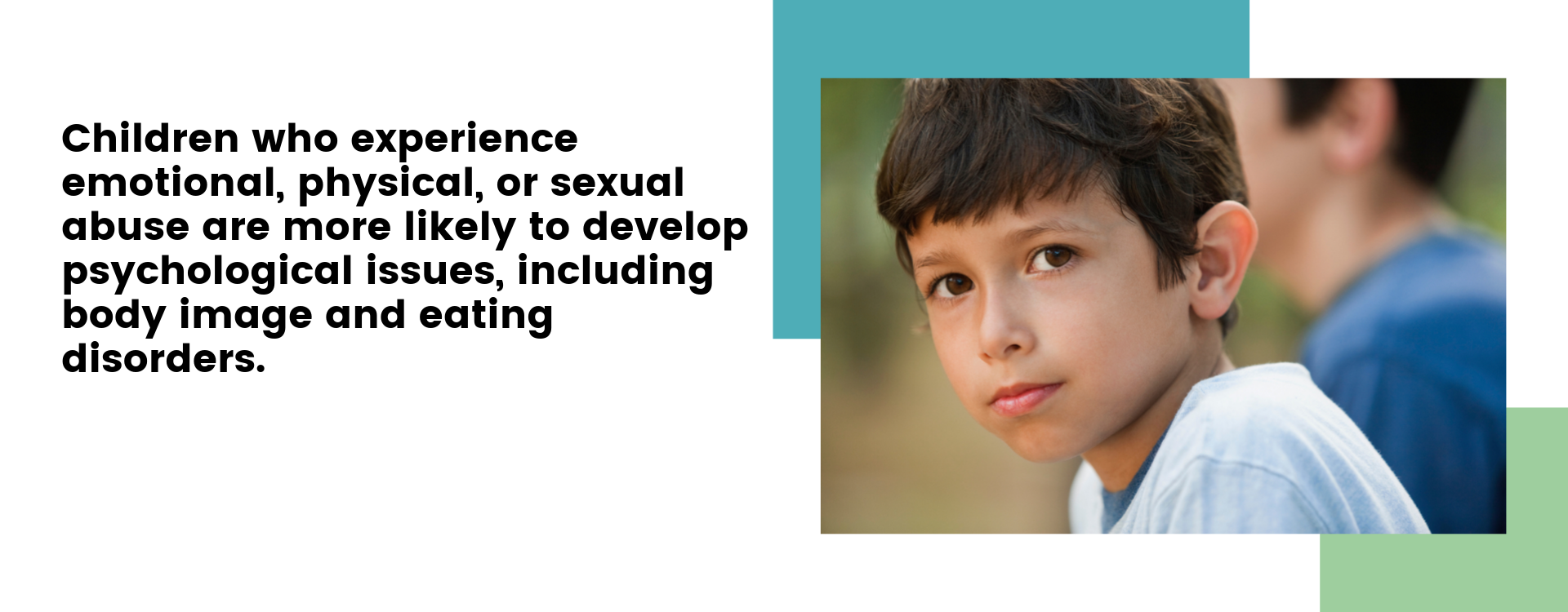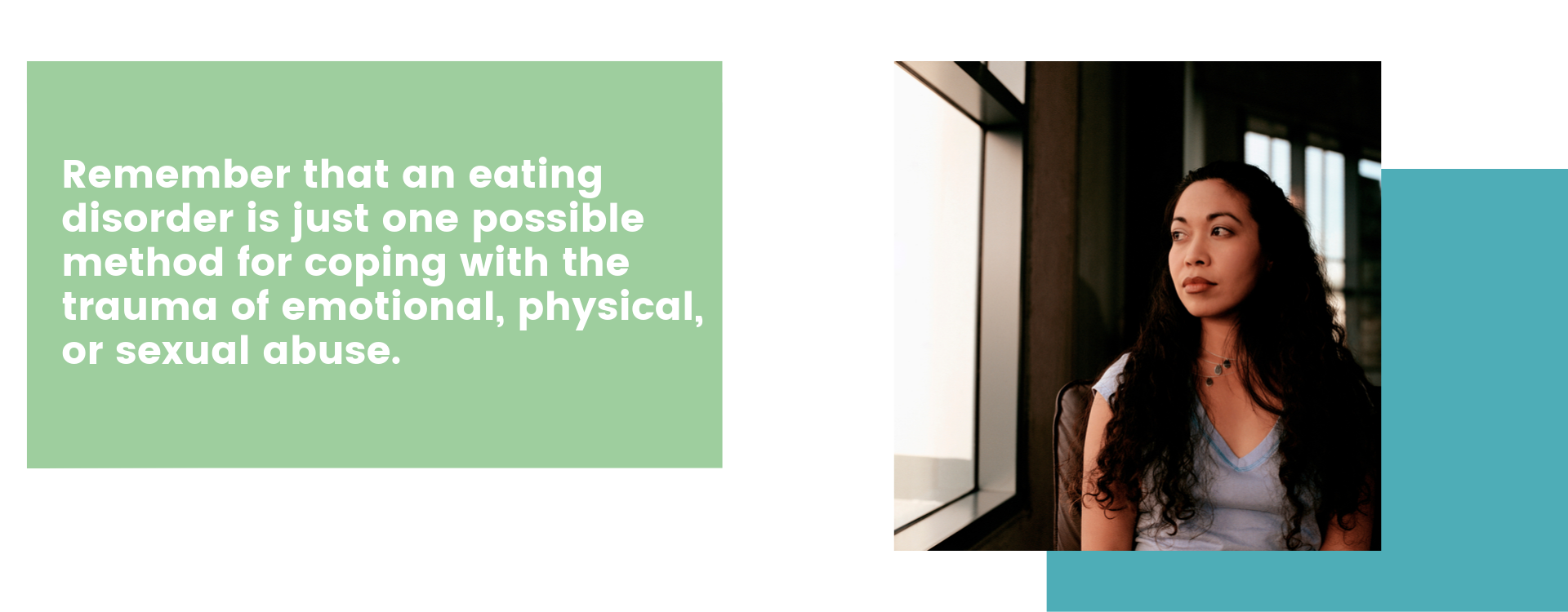Millions of people throughout the United States suffer from eating disorders such as Anorexia Nervosa, Binge Eating Disorder (BED), and Bulimia Nervosa. Though it affects both men and women, women are more likely to experience anorexia nervosa (75%) and binge eating disorders (60%).
Several factors can contribute to the onset of an eating disorder, such as genetics and family history. However, one of the most common factors linking eating disorders is a history of childhood trauma. Children who experience emotional, physical, or sexual abuse are more likely to develop psychological issues, including body image and eating disorders.
The Role of Childhood Trauma in Eating Disorders

The link between sexual abuse and eating disorders is well-documented and readily accepted by practitioners. Of particular note, however, is the evolving understanding of other trauma, such as physical and emotional abuse, and the role they can play in the development of an eating disorder. Emotional abuse, for example, can lead to low self-esteem, self-critique, and issues with body image. Eating disorders become a mechanism for maintaining control when a person feels like they none and serve as a way to avoid the emotional trauma head-on.
Trauma can be so severe that it actually disrupts the functioning of the nervous system, to the extent that it is difficult or impossible to regulate their own emotions. Negative behaviors such as binge eating or anorexia become coping mechanisms that keep trauma victims from processing difficult emotions. Much like Post Traumatic Stress Disorder (PTSD), dysregulation of the body’s psychobiological systems results from the exposure to childhood trauma.
Emotional Abuse and Eating Disorders
Emotional abuse takes the form of continual criticism, insults, or attacks against a child’s character. Over time, these children internalize the criticism, perhaps even believing it to be true. This emotional abuse and its internalization makes children susceptible to eating disorders and dysfunctional behavior. Children who are emotionally abused are just as likely to develop eating disorders as those who experience physical or sexual abuse. A recent study explored the clinical linkages between eating disorders and emotional abuse, noting that emotional invalidation is a core component of the development of eating psychopathology. Emotional abuse poses large risk factors for later eating disorders by creating poor tolerance to distress, stymied emotional development, and problems with emotional inhibition. People who bear the brunt of repeated insults or excessive criticism, over time, develop similarly critical view of themselves, which leads to problems with body image that can manifest as anorexia, bulimia, or BED.

Sexual Abuse and Eating Disorders
The link between sexual abuse and the psychopathology of eating disorders has been extensively studied, but it is still subject to some debate. A recent review of the literature found that around 30% of eating disordered individuals sampled had experienced childhood sexual trauma or sexual abuse. There are complex associations between the type of trauma, inherent issues in self-regulation, and other risk factors that may make it difficult to pinpoint the exact effect sexual abuse has on the later risk of an eating disorder. Research does indicate, however, that people who experience sexual abuse are slightly more likely to develop bulimia nervosa than anorexia, BED, or other forms of disordered eating.
Some experts theorize that sexual abuse can cause a person to develop an eating disorder because they believe they need to look a certain way to be considered attractive. In this manner, a person can seemingly be in control of their lives, but also find an outlet for the emotional pain and turmoil of the sexual trauma.
In the case of bulimia, there is an inherent symbolism in the etiology of the disorder. For example, bulimic behavior helps a person “purge” the negative feelings associated with the trauma while the food helps fill an emotional void. They both become coping mechanisms that help a person avoid the trauma of their experience; however, it does not provide the answer that the individual needs to heal.
Stress Eating As Disordered Behavior
Though not the same as traditional eating disorders, there has been interesting studies of stress eating and how it can develop in childhood as the result of trauma. For example, a study at the University College London of identical twins found that disordered eating patterns can begin as early as two years old not because of genetics but due to environmental factors. Even in cases where the parents were obese, emotional eating was driven by environment, not genes.
In the study, when confronting stress, some children went for a favorite snack, while others lost their appetite. The parents of the children recognized these behaviors as responses to being upset or anxious. The researchers noted that emotional undereating or overeating in childhood could set the stage for possible disordered eating later in life, when stress naturally increases. A similar study at Huntington University found that the higher the stress level, the more students were likely to eat.
Eating As an Addiction
Modern psychology considers both emotional eating and binge eating as addictive behaviors. Much like illicit drugs, a person who emotionally or binge eats gets a “high” from the experience from increased dopamine levels. Like illicit substances, a person who binge eats will want more or feel like it is never enough. This is called a process addiction: it is marked by a compulsive behavior that eventually becomes a health threat because it leads to obesity and all of its associated health risks.
Emotional eating and stress eating may not be officially designated disorders in the DSM 5, but they both have links to binge eating disorder and trauma. Both can evolve from low self-esteem and cycles of shame, guilt, and overeating. When emotional and binge eating disrupt daily functioning and life quality, it can become Binge Eating Disorder (BED)
Is There a Link Between Eating Disorders and PTSD?
 Researchers have found an interesting link between Post Traumatic Stress Disorder (PTSD) and eating disorders. For example, women who present with eating disorders also show signs of PTSD or anxiety disorders as pre-existing or comorbid conditions. Often, the presence of trauma creates anxiety or PTSD, and the eating disorder emerges as a coping mechanism for those symptoms.
Researchers have found an interesting link between Post Traumatic Stress Disorder (PTSD) and eating disorders. For example, women who present with eating disorders also show signs of PTSD or anxiety disorders as pre-existing or comorbid conditions. Often, the presence of trauma creates anxiety or PTSD, and the eating disorder emerges as a coping mechanism for those symptoms.
In fact, some research suggests that post-traumatic stress disorder can actually be a mediator between experiencing trauma and developing an eating disorder. For example, a National Women’s Study found than a high percentage or women who experienced an eating disorder also had a diagnosis of PTSD. Many survivors of childhood trauma have at least some symptoms of PTSD, suggesting that they have subthreshold manifestations of the disorder.
At a basic level, there are many commonalities between post-traumatic stress disorder and eating disorders. For example, people with either condition tend to be impulsive and may experience dissociation. It is important to note, however, that the method of dissociation may be different. Binging and purging is a method of dissociating from trauma, as is using illicit drugs or alcohol to escape.
How Eating Disorders Impact Mental Health
Eating disorders have obvious negative health effects. From a physical perspective, a person with an eating disorder may be at higher risk for:
- Obesity
- Malnutrition
- Conditions resulting from micronutrient deficiencies
- Osteoporosis
- Certain types of cancers (for example, esophageal cancer from purging)
Aside from the physical health issues, a person with an eating disorder often has a co-occurring mental health disorder. For example, a person with an eating disorder may have PTSD, depression, anxiety, or other dissociative pathology. To remove themselves even further from the trauma, it is not uncommon for a person with an eating disorder to also have a substance use disorder or alcohol use disorder.
Unfortunately, the symptoms of an eating disorder closely mirror those of other disorders. It is essential for mental health professionals to uncover all possible co-occurring mental health and substance abuse issues in order to facilitate a long-term recovery.
Remember that an eating disorder is just one possible method for coping with the trauma of emotional, physical, or sexual abuse. A person may have several different unhealthy coping mechanisms that keep them from confronting the trauma of their childhood experience. Only by addressing the trauma in a healthy way can an individual affected by an eating disorder or co-occurring conditions expect to make a meaningful recovery.

How Can We Treat Eating Disorders?
Treatment of eating disorders is multifaceted. Because of the complex factors involved and the history of childhood trauma, a person cannot simply “stop” binge eating or other disordered eating behavior. Recovering from an eating disorder requires professional intervention, usually with a multidisciplinary team.
Eating disorder treatment usually begins at a primary care provider’s office. Often, the first step in receiving treatment is admitting that a problem exists. A primary care provider can help connect each individual with resources in the community, from mental health specialists to support groups that allow people to talk through their trauma.
 Once connecting with a mental health specialist, the treatment for the eating disorder and any co-occurring mental health issues can begin. An integrated, trauma-informed approach is essential to facilitating a long-term recovery.
Once connecting with a mental health specialist, the treatment for the eating disorder and any co-occurring mental health issues can begin. An integrated, trauma-informed approach is essential to facilitating a long-term recovery.
Any number of professionals may be involved in the treatment process for eating disorders: doctors and therapists can help manage the physical and psychological aspects of the disorder, while registered dieticians can provide advice about following a healthy lifestyle filled with enriching, good-for-you foods. To help assure recovery continues for the long-term, ongoing support in the form of group therapy is essential.
Specifically, the following interventions may be effective in treating eating disorders:
- Cognitive behavioral therapy (CBT). This evidence-based approach helps people challenge and overcome their distorted cognitive perceptions, thereby improving emotional regulation and helping people develop healthy coping mechanism for their problems.
- Residential/Inpatient Treatment. In many cases, inpatient treatment is necessary to help people initially break the cycle of shame and disordered eating.
- Dialectical Behavior Therapy. With a wide body of evidence for treating anorexia, bulimia, and BED, DBT also works to change maladaptive behaviors. Interventions focus on building mindfulness, reacting healthfully to distress, and regulating emotions.
- Support groups and outpatient settings. Ongoing support and safe spaces to talk about trauma and other triggers for disordered eating provides people with the tools they need to sustain recovery.
The Dangers of Untreated Eating Disorders
Eating disorders can be deadly without appropriate intervention. Anorexia, in particular, can kill a person affected due to cardiac arrhythmias, liver failure, kidney failure, and other consequences of malnutrition. A person with bulimia is at higher risk of developing certain types of cancer due to the amount of acid in the esophagus from purging. Obesity, a natural consequence of binge eating disorder, puts people at higher risk of heart attack, stroke, high blood pressure, and cancer.

Long Term Recovery from Eating Disorders
Treatment is available for eating disorders, and it can be incredibly effective. Understand, however, that eating disorders don’t “go away.” Due to their past history, a person recovering from an eating disorder is always susceptible to relapse. That is why it is so important for a person to understand the complex factors and triggers that contribute to their disorder.
Childhood trauma is a common thread in many people who experience eating disorders. On the other hand, it is usually only one facet of the condition. Other complex casualties, such as PTSD and other co-occurring mental health conditions, can also play a role in the development of disordered eating patterns.
Eating disorders can lead to negative physical and mental health effects. Left untreated, individuals experiencing eating disorders are at higher risk for a variety of illnesses and even death. Fortunately, effective treatments are available and consist of integrated psychotherapy, healthy diets, and medication. Mental health professionals, physicians, and peers can all play an integral role in supporting a person’s treatment and recovery.
A multidisciplinary team should use trauma-informed care and evidence-based treatments such as cognitive behavioral therapy or dialectical behavioral therapy in the treatment of eating disorders. After a person completes inpatient or intensive outpatient intervention, ongoing support in the form of group therapy is essential to support a long-recovery. By addressing the underlying trauma and developing healthy coping mechanisms, a person with an eating disorder can overcome their obstacles and lead a healthy, happy life.

Assistant Executive Director
Cassandra Gibson-Judkins, Assistant Executive Director, is a licensed clinical social worker who has dedicated her career to providing services to children, youth and families. She has been a loyal employee at Eggleston since 1978. During her tenure at Eggleston, she has held numerous leadership positions in residential treatment, foster family, adoptions, and behavioral health program divisions. In addition, she served at the Department of Children and Family Services form 10 years, specializing in adoption services.


